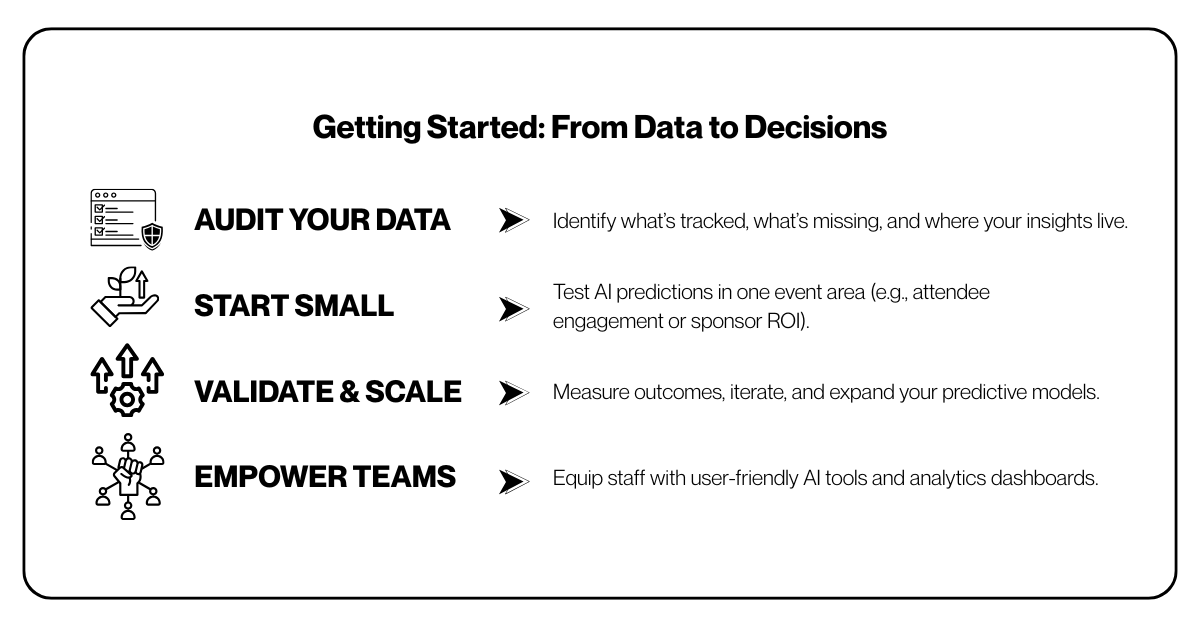The events industry in 2025 is no longer just about logistics, it’s about intelligence. Artificial intelligence (AI) and machine learning (ML) are now the driving forces behind smarter, more personalized, and more profitable events. From predicting attendee behavior to optimizing sponsorship strategies, these technologies are enabling event leaders to make decisions powered by real-time insights rather than intuition.
Let’s explore how AI and ML are shaping the next generation of events, where data meets human connection.
Predicting and Influencing Attendee Behaviors
Smarter Registration and Attendance Forecasting
Machine learning models analyze historical and live data to forecast:
- Peak registration windows, helping organizers time campaigns for maximum impact
- Conversion likelihood for early-bird, general, and last-minute registrations
- No-show probabilities based on past attendance patterns and engagement scores
- Geo-behavioral trends, informing hybrid or regional event decisions
Predictive Engagement Analytics
AI now tracks multi-channel touchpoints — emails, apps, social media, and live interactions to forecast:
- Session popularity and drop-off points
- Networking preferences based on shared interests or industries
- Real-time engagement during hybrid sessions
- Booth visit intent and heatmapping of foot traffic
Hyper-Personalization at Scale
Using attendee data and GenAI personalization tools, events can now offer:
- Tailored session recommendations based on individual goals
- AI-powered matchmaking for networking and partnerships
- Dynamic content feeds that evolve with attendee behavior
- Personalized post-event follow-up and learning resources
Reimagining Sponsorship and Revenue Opportunities
Intelligent Sponsor-Audience Matching
ML algorithms analyze audience demographics, behaviors, and past engagement to:
- Identify high-value sponsor-audience pairings
- Predict lead quality and conversion potential
- Optimize booth or activation locations using behavioral heatmaps
- Suggest personalized sponsorship packages aligned with audience intent
Predictive Revenue Optimization
Advanced AI pricing models now help organizers:
- Implement dynamic sponsorship pricing based on real-time demand
- Detect upsell opportunities through behavioral clustering
- Predict churn risk for recurring sponsors and recommend retention tactics
- Model ROI projections before finalizing sponsor deals
Predicting Content and Engagement Trends
AI-Driven Topic and Sentiment Analysis
Machine learning continuously scans social media, industry reports, and attendee feedback to identify:
- Trending topics and rising thought leaders
- Content gaps that can differentiate your program
- Session formats with the highest engagement potential
- Emerging sentiment trends that inform next year’s content strategy
Speaker and Format Optimization
Using historical engagement data and audience behavior, AI predicts:
- Speaker performance and audience resonance
- Optimal session duration and delivery style
- Ideal timing for hybrid or on-demand sessions
- Real-time audience sentiment during live talks
Implementation: Building a Future-Ready Event Data Ecosystem
Building a future-ready event data ecosystem starts with a strong foundation of reliable, ethically sourced, and well-structured data. Every successful AI strategy relies on clean and connected datasets that integrate seamlessly across platforms — from CRMs and registration systems to engagement apps and analytics tools. Establishing unified KPIs and consistent event performance metrics ensures that insights are meaningful and comparable across events, while continuous feedback loops allow machine learning models to improve over time.
Equally important is the technology infrastructure that supports these systems. Organizations need a robust event data platform (EDP) capable of AI integration, along with predictive analytics dashboards that give organizers and sponsors real-time visibility into performance and engagement. Data governance must remain a top priority, ensuring compliance with global standards such as GDPR and CCPA. Leveraging generative AI tools further enhances the process by transforming raw data into actionable strategies and automated recommendations that drive smarter decision-making.
Finally, the human element remains at the heart of every AI transformation. Future-ready event teams are those that blend creativity with data literacy, fostering collaboration between marketing, analytics, and experience design functions. Ongoing training in AI interpretation and data storytelling is essential to help teams translate insights into action. Above all, executive commitment and cultural alignment are key to sustaining long-term adoption and ensuring AI becomes a strategic advantage rather than just a technical upgrade.
Conclusion: From Predictive Insight to Event Reinvention
The future of the events industry belongs to those who move from data collection to intelligent prediction. AI and machine learning are no longer optional tools, they are the engines that drive anticipation, personalization, and profit. Event leaders who unify their data, invest in scalable AI infrastructure, and cultivate data-literate teams will outpace those who still rely on instinct and outdated processes.
This momentum toward intelligent transformation is what fuels RevvedUP 2026 (March 23–24 at The Vinoy Resort, St. Petersburg, FL), a gathering built for those determined to shape the next era of events. Over two days, innovators and executives will explore how predictive technologies, data ecosystems, and AI-led design are redefining engagement, sponsorship, and event profitability. It’s not just about keeping up with innovation, it’s about leading it. By 2026, progress won’t come from playing it safe. The true edge will belong to those bold enough to reimagine how intelligence, creativity, and technology come together to create extraordinary experiences.
About the Author
Heather Holst-Knudsen is a distinguished figure and expert in the events, media, marketing and technology sectors. Using her extensive experience, she guides clients in adapting to structural economic and market changes, seizing the chance to innovate and evolve. She specializes in digital and data disruption and opportunity, exploring how these overarching factors can impact revenue growth, customer-centricity, operational efficiency, profit margins, and the overall valuation of companies in both public and private markets. Her journey began at her family business, Thomas Publishing Company, where she honed her skills. She further expanded her expertise by holding positions at early industry giants Miller Freeman, Reed Elsevier, and IDG. Returning to Thomas Publishing, Heather founded and spearheaded Manufacturing Enterprise Communications, an integrated media portfolio connecting buyers and sellers in the manufacturing and technology sectors. Starting in 2015 and spanning the next seven years, she leveraged her expertise as a revenue and business leader in various SaaS businesses, including Feathr, Gleanin, Brella and Edflex.
Heather is deeply passionate about digital innovation, data monetization, and AI and how these strategies fuel revenue growth, profitability, and company valuation. To serve and create value for clients in these areas, she launched H2K Labs, dedicated to generating and leveraging value through data for media, business information, events, and adjacent technology and service markets.









